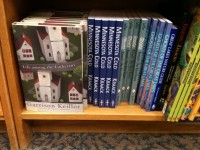Submission Seduction
For about five years my goal as a rookie writer was to build a short story collection, one hundred fifty pages long, to submit to The Loft’s Mentor competition. A copy of my first submission is stored in the back of a drawer of short stories, all unread by anybody outside early writing group members or the Mentor program judges. I don’t feel exactly like I need to extend a late apology to the judges, but honestly, I haven’t found one story in that first collection worth revising.
Anne Lamott’s Bird by Bird is one of those books that should be read by writers ready to take their  craft to a new level. While there is a certain amount of kismet in being published, there is also a whole lot of hard work, drive and insecurity. Writing about the joy and insecurity of publishing, Lamott suggests writers tape a line from Cool Running, a movie about the first Jamaican bobsled team, above their desk: “If you’re not enough before the gold medal, you won’t be enough with it.”
craft to a new level. While there is a certain amount of kismet in being published, there is also a whole lot of hard work, drive and insecurity. Writing about the joy and insecurity of publishing, Lamott suggests writers tape a line from Cool Running, a movie about the first Jamaican bobsled team, above their desk: “If you’re not enough before the gold medal, you won’t be enough with it.”
Once you have been published, the game is on. You want your name to be on other book spines or on the cover of a journal. Maybe Lamott or Margaret Atwood or Stephen King don’t feel the need to prove themselves worthy one more time. I do know writers who have won national awards, who have ten books to their names, who are asked to speak at big events, who still collect rejection letters from agents or publishers. They sound a whole lot like I feel.
None of this stops writers from submitting. Contests, magazines, agents all have the chance to embrace our work or say no thank you. Maybe your hero drinks beer and the screening person has a bad hangover. Maybe the magazine published too many stories like yours about young kids dealing with their parents’ sexuality. You’ll never know. Your work is brilliant and needs to find the right person who appreciates what you’ve accomplished. None of this is personal. If you’ve done a good scouting job to identify an agent or publisher or editor who welcomes writing like your best effort, the rest is often chance.
To be a published writer you have to submit your best pieces somewhere. There are hundreds of magazines that want your work if they knew about it. You might get paid or you might have an afterglow that carries you through a current revision project. Visit a site like Duotrope to help match your work with the market or print out a list of the top fifty literary magazines and begin researching where you fit as a writer.
One lesson learned last year is to think ahead about future hopes for your work. The afterglow can dim if you give your favorite story or poem to a small online journal then discover it has become ineligible for most other publications. First publication rights can only be used once and even small journals want to be your work’s first exposure to readers. But if you’re building credentials, every publication is a diamond bullet point. So open your browser and build a plan for entering the game. Submission can be very seductive.

